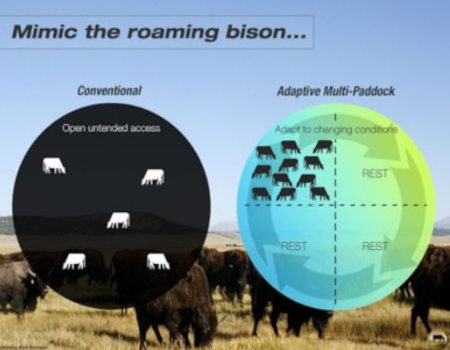By Amanda Sorensen
Dr. Hodbod and team will be exploring the social, economic, and ecological impacts of adopting more sustainable livestock management techniques.
Throughout the United States, cattle producers rely on the wellbeing of their land to ensure their operation exists for the next generation. However, for the North Central region and other major livestock production areas of the United States where cattle spend most of their lives roaming out on the pasture, the land can suffer from increasing degradation, threatening the long-term livelihood and socio-economic wellbeing of these livestock farmers. While there are livestock management techniques that reduce soil erosion and increase water infiltration on the land, leading to increased fodder availability and biodiversity, many farmers have not adopted them.
In a new project, Department of Community Sustainability faculty member Dr. Jennifer Hodbod and her colleagues seek to take a holistic approach to understanding the sustainability of livestock agriculture by looking at what type of grazing management system creates the highest levels of ecological, economic, and social wellbeing for the farm and farmer. The project will also explore how to overcome uncertainty around these management systems outcomes to increase adoption. Dr. Hodbod received a grant of $249,999 from the North Central Sustainable Agriculture Research and Education organization to do this work. The research leadership team working with Dr. Hodbod include Dr. Matt Raven, also from CSUS, Dr. Melissa McKendree from AFRE, and Florencia Colella from MSU Extension.
Over the course of the 3-year project, the research team are looking to work with cow-calf producers using any management system from all across Michigan. All of the participants will receive training around:
- assessing their ecological wellbeing by tracking their lands’ health and quality over time
- managing and tracking their operations economic wellbeing to be better able to assess their own profitability, and
- their social wellbeing to track their individual quality of life related to their work as livestock producers.
The research will specifically investigate how the adoption of adaptive multi-paddock grazing on livestock farms in Michigan influences the ecological wellbeing of the land, the economic wellbeing of the farm operation, and the social wellbeing of the farmer, compared to more traditional continuous grazing. Adaptive multi-paddock grazing is a livestock management strategy which uses densely packed herds in small paddocks for short durations, with paddocks then given long periods of rest to regenerate. Livestock numbers and rotations are adjusted as needed to match available forage within the farm as conditions change. A sub-group of participants will be trained in adaptive multi-paddock grazing to assess change in wellbeing over time with adoption.

Example of Adaptive Multi-Paddock (AMP) grazing uses high livestock densities for short durations between long periods of forage rest to catalyze accelerated grass growth.
Dr. Hodbod says of this work, “Embedding all three types of wellbeing [social, ecological, financial] together is unique and builds a more holistic picture of sustainability on the farm. Our approach helps us to understand where the sustainability challenges are and how best to support Michigan’s cow-calf operations. Animal agriculture is one of the biggest challenges in global sustainability and we are trying to figure out how to make cow-calf production more sustainable for individual farms and at the sector level.”
A producer network will be created so that both during and after the project the network becomes an ongoing support system for participating producers – particularly those who are changing their management. Dr. Hodbod notes that this networking is an important component of the project as “there is opportunity for lessons learned and best practices to be shared between producers and with MSU, who can then better support other producers.”
If you, or anyone you know is a cow-calf producer here in Michigan with 10+ years of operation and are interested in participating in this project, please contact Dr. Hodbod at jhodbod@msu.edu with the email subject line: Sustainable Ag. Research.
Source : msu.edu